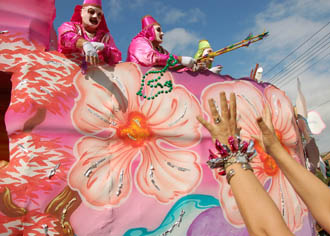Carnival Time Means Big Business
A new study on the economic impact of the 2009 Mardi Gras season by two professors at Tulane University estimates the total direct economic impact and brand value of Mardi Gras on the New Orleans economy at approximately $322.2 million.

Not only is Mardi Gras the "greatest free show on earth," it's also a substantial revenue producer for the city and a significant part of the lifeblood of the community's economy. (Photo by Sally Asher)
Paul A. Spindt, the Keehn Berry Professor of Banking and Finance at the A. B. Freeman School of Business, and Toni Weiss, a professor of practice in economics at Tulane, performed the new study, compiled on behalf of the New Orleans Carnival Krewe Civic Fund.
Mardi Gras represents slightly more than 1.6 percent of the city's gross domestic product (GDP) when combining direct expenditures and a "brand value" estimate to the calculations, the researchers said.
"A 12-day festival comprising such a significant component of a major metropolitan city's GDP is quite remarkable," they commented.
Spindt and Weiss said their report was compiled using economic data on Mardi Gras spending in the City of New Orleans exclusively, and is limited to actual expenditures obtained from out-of-town hotel visitors, local citizens, carnival krewe officials, krewe members and city government.
The study claims a net fiscal benefit to the City of New Orleans of approximately four and a half to one, representing the incremental tax revenues earned by the city over the cost of its direct services to support the event.
"Our economic impact numbers are likely understated," they added, "because they do not include incremental restaurant business, airport usage or any business fixed investment, and probably underestimates Mardi Gras related spending locally."
They noted that previous economic studies on Mardi Gras evaluated metro/regional data and used different data tabulation methodologies than their own.
